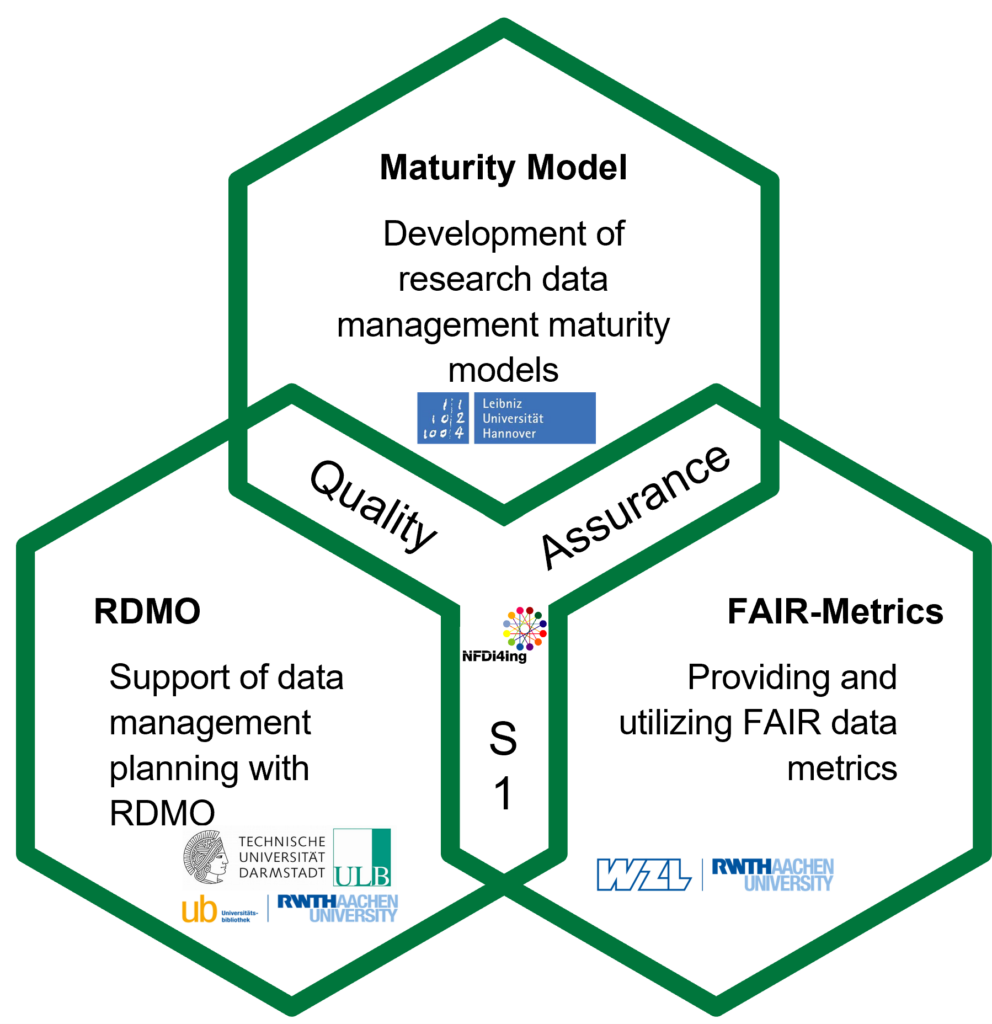The base service “Quality assurance in RDM processes and metrics for FAIR data” in NFDI4Ing includes the support of data management plans with RDMO, the development of maturity models for research data management processes and the provision and maintenance of FAIR data metrics. The common goal is to ensure the quality of research data management in engineering research through each individual service. In the following, we present our efforts in the fields of maturity models, data management planning with RDMO, and FAIR metrics.

Maturity Models
The development of maturity models for the assessment of research data management processes in research projects is the topic of our measure S-1-1. The strategic orientation of the maturity models and the assessment framework was presented at the first Conference on Research Data Infrastructure (CoRDI).
In this context, process areas that enable a differentiated and research-oriented assessment of research data management were defined. In this way, researchers can carry out an assessment of their planning, data collection, analysis, archiving, and access in the context of research data management. The basis for this is an overarching maturity characteristic that applies to the individual models. This classifies five defined levels of maturity from an intuitive to a community standard-oriented to an optimising implementation of the research data management for the defined process areas.
The individual models contain maturity-specific goals at the individual levels that need to be met for a fully comprehensive research data management in research projects. This is based on associated practices that describe the goals in more detail. The extended abstract in the proceedings [1] as well as the presentation [2] are publicly available. An ongoing elaboration and documentation of the maturity models is available at the following link: maturitymodel.nfdi4ing.de.
RDMO
The support of data management planning with RDMO and fostering DMP templates in engineering are the topics of the measures S-1-2 & S-1-3. After one year of running, the NFDI4Ing RDMO has 164 users planning their research data management in 145 projects. As the first service in the whole NFDI, we have recently implemented the new NFDI-AAI allowing researchers from all over the world to login with their institutional credentials or via login services like Orcid.
We have also implemented a second questionnaire into RDMO which is specifically designed for those researchers that develop software in their project. For this software management plan catalog, which was originally developed by the Max Planck Digital Library (MPDL), we have already collected feedback and will foster further development with the colleagues.
Upcoming are two new features: the first one will be a plugin to export an RO-crate template from your RDMO project. Metadata collected in your data management plan will be automatically stored as linked data in the ro-crate metadata file. Additionally, we started working on our first prototype for the DMP review service. Based on the answers given during the interview, the DMP review feature will present recommendations for improving your data management as well as additional information for your grant proposal.
We are still collecting feedback for the upcoming updated version of the NFDI4Ing question catalog. If you have any suggestions for improvement, please let us know: rdmo@nfdi4ing.de.
FAIR Metrics
FAIR metrics in the engineering sciences is the topic in measure S-1-4. We evaluated available FAIR metrics and provided our findings in two recent conference contributions: At the CoRDI 2023 in Karlsruhe differences and design elements in existing general FAIR metrics were presented. The metrics discussed (i.e., Wilkinson et al., RDA, FAIRsFAIR and EOSC) differ mainly in their granularity as well as in formulations, and some metrics provide specific elements like e.g. priorities. The extended abstract in the proceedings [3] as well as the presentation [4] are publicly available. The NFDI4Ing conference 2023 was the right place to give an introduction to the 15 FAIR guiding principles, and to ask the community how they make their engineering data FAIR. It turns out that some metric elements are more engineering-specific (e.g. community standards in R1.3.), while others are more generic and rather independent of engineering (e.g. AAI for authentication and authorization in A1.2.). The presentation is findable and accessible here. Both contributions help answering the question whether the engineering community needs their own FAIR metrics and – if yes – how such a metric could be designed.
Mario Moser
David Wallace
Max Wawer
Jürgen Windeck
